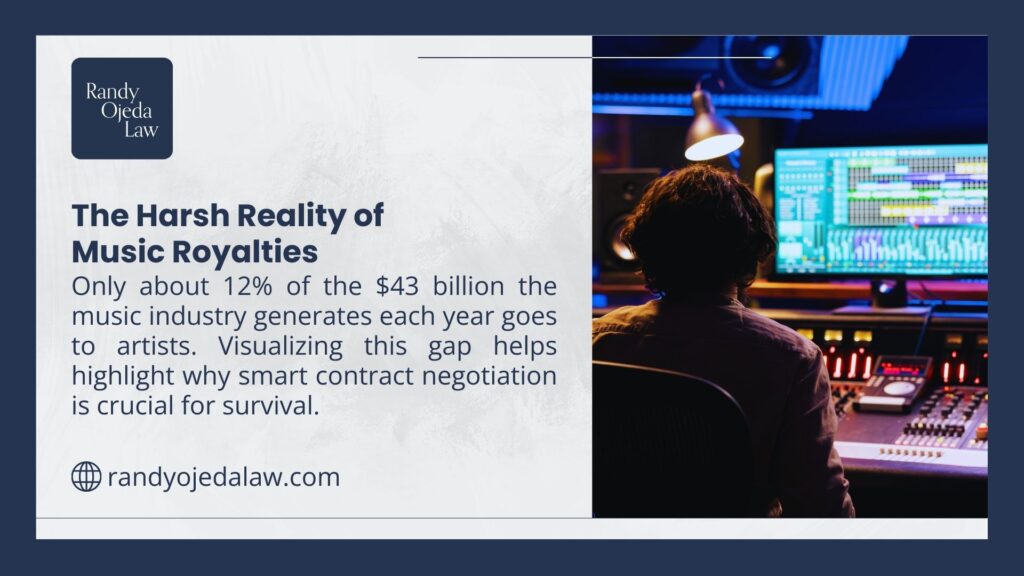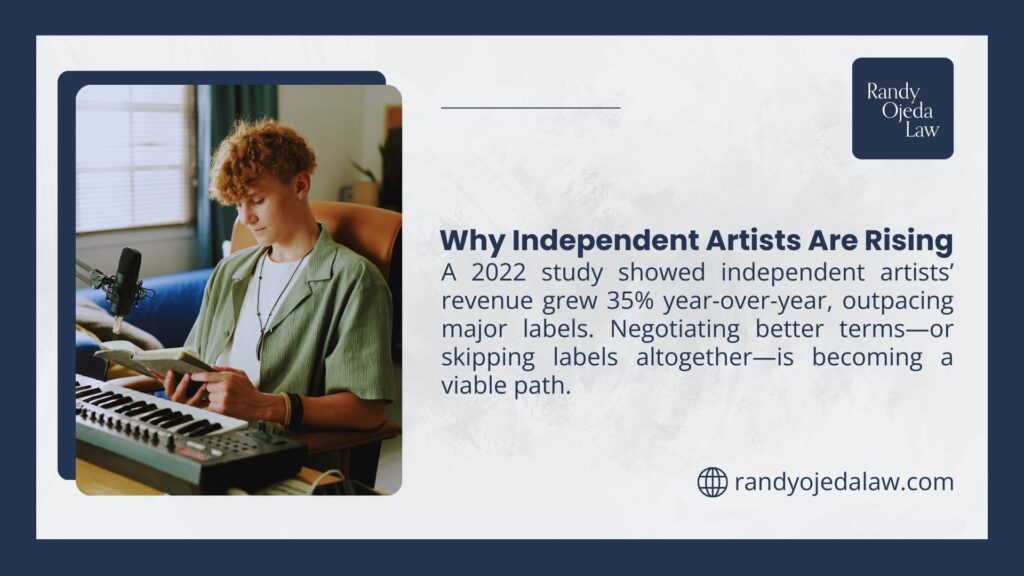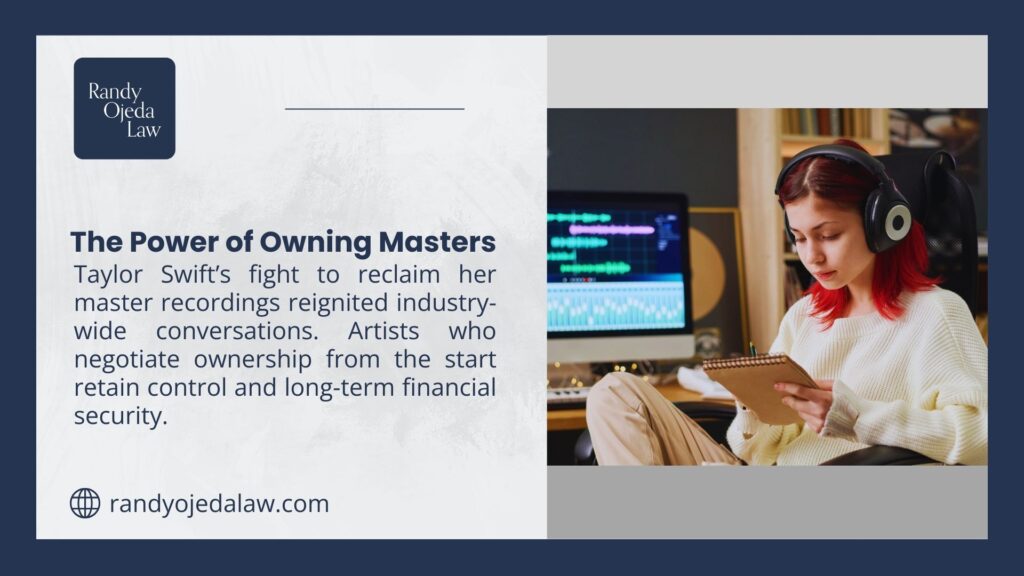88% of recording artists never see a dime beyond their initial advance. That’s not because they lack talent or don’t work hard enough. It’s because they signed contracts that were stacked against them from day one.
The music business runs on contracts. Every handshake deal, every “we’ll figure it out later” conversation, every rushed signature on a piece of paper can make or break an entire career.
Record labels, managers, and publishers have armies of lawyers. They’ve been playing this game for decades. Meanwhile, artists often treat contract negotiation like an afterthought – something to deal with after the “real” work of making music is done. This backwards thinking has cost countless musicians their financial freedom and creative control.
The difference between artists who build sustainable careers and those who struggle isn’t always talent. Often, it comes down to understanding how to negotiate a music contract that actually protects their interests.
What’s in Music Contracts?
Music contracts come in different flavors, but they all boil down to the same basic question: who gets what, when, and under what conditions?
Recording contracts are probably what most people think of first. These are deals with labels to produce and distribute music. The label puts up money for recording, marketing, and distribution. In return, they get a piece of everything – sometimes a very large piece.
Management contracts define the relationship between artists and their representatives. Managers handle business affairs, career strategy, and deal-making. They typically take 15-20% of everything an artist earns, though established artists sometimes negotiate this down to 10-15%.
Publishing deals focus on the songwriting side. These contracts can be goldmines or disasters, depending on the terms. Publishing rights generate income for decades, long after an artist stops touring or recording.
The mistake many artists make is viewing these as separate, unrelated agreements. Smart negotiation means understanding how different contracts interact and affect each other.
Getting Ready for Negotiations
Most contract negotiations are lost before they even begin. Artists show up unprepared, desperate, or both. They accept the first offer because they’re afraid it might be the only one.
Preparation changes everything. It’s the difference between negotiating from a position of strength versus begging for scraps.
Know the Numbers
Industry standards exist for a reason – they give both sides a starting point for negotiations. New artists might see recording royalty rates around 8-12%. Established artists with proven track records can command 20-25% or higher.
The percentage doesn’t tell the whole story. A 15% royalty rate on net receipts after the label deducts marketing, distribution, and “overhead” costs might be worse than a 10% rate on gross revenues.
Management commissions have their own patterns. The industry standard hovers around 15-20% for most artists. However, managers working with newer acts who require significant upfront investment might push for 20-25%. Established artists with steady income streams often negotiate this down.

Document Everything That Makes Artists Valuable
Streaming numbers, social media followers, past performance revenues, and merchandise sales – all of this data becomes ammunition in contract negotiations. Labels and managers want to work with artists who can demonstrate growth and engagement, not just talent.
Smart artists compile this information into a simple, professional package.
Set Non-Negotiable Boundaries
Every artist needs to identify their deal-breakers before sitting down to negotiate. Maybe it’s maintaining creative control over album artwork.
Perhaps it’s retaining ownership of master recordings after a certain period. Whatever matters most should be decided in advance, not in the heat of negotiation.
| Contract Element | New Artist Range | Established Artist Range | Priority Level |
| Recording Royalties | 8-15% | 18-25% | Critical |
| Management Commission | 18-25% | 10-18% | Critical |
| Contract Length | 3-5 years | 1-3 years | Important |
| Creative Approval Rights | Limited | Extensive | Critical |
| Advance Amount | $5K-$50K | $100K+ | Moderate |
The Terms That Make or Break Careers
Some contract clauses are merely annoying. Others can destroy careers. Knowing which is which separates successful artists from cautionary tales.
Royalty Structures and Revenue Splits
Royalty rates get all the attention, but the calculation method matters more.
- Is the percentage based on gross revenues or net receipts?
- What expenses get deducted before calculating royalties?
- How are streaming revenues divided between different platforms?
Many contracts include escalating royalty clauses – the percentage increases as sales milestones are reached. These can be valuable for artists expecting significant commercial success. However, the milestones need to be realistic, not fantasy numbers designed to keep rates low.
Performance royalties, mechanical royalties, and synchronization rights each generate income differently. Bundling them together might seem simpler, but it usually benefits the other party more than the artist.
Creative Control
This is where many artists get emotional, and rightfully so. Creative control affects everything from song selection to album artwork to tour routing. It’s the difference between being an artist and being a highly paid employee.
Recording contracts often include clauses about “commercially acceptable” material. This vague language gives labels broad authority to reject songs they don’t think will sell. Artists need to negotiate specific criteria for what constitutes acceptable material.
Marketing and promotional decisions also fall under creative control. Some artists want final approval over how their image is used in advertising. Others care more about maintaining control over their social media presence.
Contract Duration and Option Periods
Contract length directly affects flexibility. Shorter agreements provide more opportunities to renegotiate as careers evolve. Longer contracts often come with better upfront terms but can become problematic if the relationship sours.
Option periods are particularly tricky. These clauses allow labels or managers to extend contracts under predetermined terms. The artist doesn’t get to renegotiate; they either accept the extension or breach the contract.
Smart artists negotiate performance benchmarks tied to option periods. If the label wants to extend the contract, they need to have achieved specific goals – album sales, radio play, touring revenue, whatever metrics matter most.

Why Professional Legal Help Isn’t Optional
The music industry has a long, ugly history of artists getting screwed by contracts they didn’t understand. The complexity of modern agreements makes professional legal representation essential.
Music lawyers understand industry standards and can spot problematic language that might not be obvious to artists. They also have relationships with industry professionals who can facilitate smoother negotiations.
What Good Legal Representation Does
A competent music contract lawyer participates in negotiations. They understand which terms are worth fighting for and which battles aren’t worth the political capital.
The best attorneys also educate their clients about the implications of different contract terms. They explain complex legal language in plain English and help artists understand the long-term consequences of their decisions.
When considering music lawyer costs, artists should think about return on investment. A skilled attorney can often negotiate improvements that more than pay for their fees.
Red Flags That Scream “Get a Lawyer Now”
Some contract terms should immediately trigger a call to legal counsel. Perpetual rights assignments, unconscionable royalty rates, or clauses that give the other party broad authority over an artist’s career all warrant professional review.
Working with a music contract review lawyer becomes even more important when dealing with complex multi-album deals or agreements that bundle different types of rights together. The most effective music contract negotiation lawyers bring both legal expertise and industry knowledge to the table.
Negotiation Psychology
Contract negotiation is about human psychology. Understanding how people make decisions can be just as important as understanding royalty calculations.
Information as Currency
Knowledge is power in negotiations. The more artists know about the other party’s needs, constraints, and alternatives, the better they can craft mutually beneficial agreements.
This means researching labels’ current roster, recent signings, and business priorities. It means understanding managers’ other clients and their track record of career development. Information gathering should happen long before formal negotiations begin.
Finding Win-Win Solutions
The best negotiations create value for both parties rather than just dividing up a fixed pie. This might mean structuring deals with performance bonuses, escalating royalty rates, or creative partnerships that benefit everyone involved.
Artists who approach negotiations as collaborative problem-solving often achieve better results than those who view it as warfare. The goal isn’t to “win” the negotiation; it’s to create agreements that serve everyone’s long-term interests.
Timing and Relationship Dynamics
When negotiations happen can be almost as important as what gets negotiated. Rushing into discussions when emotions are high or deadlines are looming rarely produces optimal results.
Building genuine relationships with industry professionals creates goodwill that can be valuable during difficult negotiations. People prefer working with individuals they like and trust, even in purely business contexts.
Protecting Creative Assets
Music represents intellectual property that can generate income for decades. Understanding how to copyright music provides essential background for these discussions.
Publishing rights often represent the most valuable long-term asset in music careers. Songs can continue generating royalties long after an artist stops performing, but only if the rights are properly protected and monetized.
Mechanical royalties from sales and streams, performance royalties from radio and live venues, and synchronization fees from films and commercials all have different values and characteristics. Smart artists negotiate these rights separately rather than bundling them together.
Making It Work Long-Term
Learning how to negotiate a music contract isn’t a one-time skill. Industry conditions change, careers evolve, and new opportunities require ongoing negotiation abilities.
The most successful artists view contract negotiation as an ongoing business skill rather than a necessary evil. They invest in understanding industry standards, building professional relationships, and developing negotiation capabilities.
They also recognize that different career stages require different contract strategies. What works for an emerging artist trying to build a fanbase might not work for an established performer with steady revenue streams.

Getting Legal Support for Music Contracts
The complexity of modern music contracts makes professional legal support essential. Artists shouldn’t try to navigate these waters alone.
At Randy Ojeda Law, the focus is on helping artists understand their options and negotiate agreements that serve their long-term interests. The firm has worked with artists at every career level, from emerging performers signing their first management agreements to established artists renegotiating major label deals.
The difference between good legal representation and great legal representation often comes down to industry knowledge. Understanding not just what the law allows, but what the industry will accept, makes negotiations more productive and relationships more sustainable. Every artist deserves agreements that support their creative goals and financial security.
